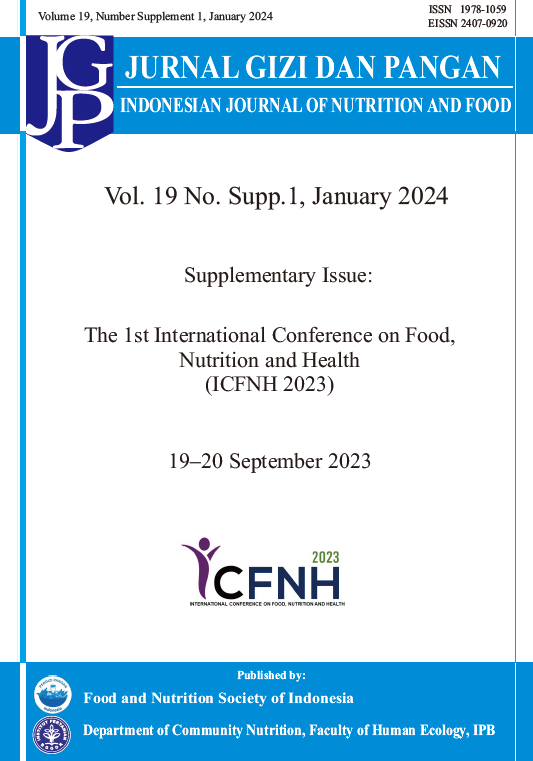Knowledge, Attitude and Behavior of Dietary Salt Intake among Staff at a Public University in Selangor
Abstract
This study examines knowledge, attitude and behavior related to dietary salt intake among UiTM Puncak Alam staff. A cross-sectional study was conducted among 300 UiTM Puncak Alam staff. Respondents were recruited conveniently to complete a self-administered questionnaire that provides information on knowledge, attitude and behavior related to dietary salt. Descriptive statistics were used to report the survey findings. Results showed that most of the respondents (95.7%) had a knowledge that overeating salt could damage their health. However, only 35.7% of the respondents recognized the daily recommendation of salt intake and 40.0% of them were able to identify the difference between salt and sodium. Regarding attitude, only 28.3% of respondents believed their salt intake would exceed dietary guidelines. In practice, 31.4% of respondents controlled their salt intake by avoiding consuming processed food, and 18.0% referred to salt labels on food packages. This study showed that UiTM Puncak Alam staff was knowledgeable on particular aspects of salt. However, their attitudes are less favorable, and they need to improve their practices toward dietary salt intake to achieve target salt intake.
References
Cheikh Ismail L, Hashim M, Jarrar AH, Mohamad MN, Saleh ST, Jawish N, Bekdache M, Albaghil H, Kdsi D, Aldarweesh D et al. 2019. Knowledge, attitude, and practice on salt and assessment of dietary salt and fat intake among University of Sharjah students. Nutr 11(5):941. https://doi.org/10.3390/nu11050941
Du X, Fang L, Xu J, Chen X, Bai Y, Wu J, Wu L, Zhong J. 2022. The association of knowledge, attitudes and behaviors related to salt with 24-h urinary sodium, potassium excretion and hypertensive status. Sci Rep 12(1): 13901. https://doi.org/10.1038/s41598-022-18087-x
Grillo A, Salvi L, Coruzzi P, Salvi P, Parati G. 2019. Sodium intake and hypertension. Nutr 11(9):1970. https://doi.org/10.3390/nu11091970
Grimes CA, Kelley SJ, Stanley S, Bolam B, Webster J, Khokhar D, Nowson CA. 2017. Knowledge, attitudes and behaviours related to dietary salt among adults in the state of Victoria, Australia 2015. BMC Public Health 17(1):1–16. https://doi.org/10.1186/s12889-017-4451-0
Haron H, Kamal NF, Yahya HM, Shahar S. 2020. Knowledge, Attitude and Practice (KAP) of Malay elderly on salt intake and its relationship with blood pressure. Front Public Health 8:559071. https://doi.org/10.3389/fpubh.2020.559071
[IPH] Institute for Public Health. 2016. Determination of Dietary Sodium Intake among the Ministry of Health Staff. Kuala Lumpur (KL): Ministry of Health.
[IPH] Institute for Public Health. 2019. National Health and Morbidity Survey communicable diseases: Risk factors and other health problems. https://iptk.moh.gov.my/images/technical_report/2020/4_Infographic_Booklet_NHMS_2019_-_English.pdf [Accessed 6th June 2021].
Krejcie RV, Morgan DW. 1970. Determining sample size for research activities. Educ Psychol Meas 30(3):607‒610.
Lee YY, Wan Muda WAM. 2019. Dietary intakes and obesity of Malaysian adults. Nutr Res Pract 13(2):159‒168. https://doi.org/10.4162/nrp.2019.13.2.159
Li X, Alu A, Wei Y, Wei X, Luo M. 2022. The modulatory effect of high salt on immune cells and related diseases. Cell Prolif 55(9):e13250. https://doi.org/10.1111/cpr.13250
Naing C, Yeoh PN, Wai VN, Win NN, Kuan LP, Aung K. 2016. Hypertension in Malaysia: An analysis of trends from the national surveys 1996 to 2011. Medicine (Baltimore) 95(2):e2417. https://doi.org/10.1097/MD.0000000000002417
Patel Y, Joseph J. 2020. Sodium intake and heart failure. Int J Mol Sci 21(24). https://doi.org/10.3390/ijms21249474
Sazlina SG, Sooryanarayana R, Ho BK, Omar MA, Krishnapillai AD, Mohd Tohit N, Inche Zainal Abidin S, Ariaratnam S, Ahmad NA. 2020. Cardiovascular disease risk factors among older people: Data from the National Health and Morbidity Survey 2015. Plos One 15(10):e0240826. https://doi.org/10.1371/journal.pone.0240826
Shangguan S, Afshin A, Shulkin M, Ma W, Marsden D, Smith J, Saheb-Kashaf M, Shi P, Micha R, Imamura F et al. 2019. A Meta-analysis of food labeling effects on consumer diet behaviors and industry practices. Am J Prev Med 56(2):300‒314. https://doi.org/10.1016/j.amepre.2018.09.024
Unger T, Borghi C, Charchar F, Khan NA, Poulter NR, Prabhakaran D, Ramirez A, Schlaich M, Stergiou GS, Tomaszewski M et al. 2020. 2020 International society of hypertension global hypertension practice guidelines. Hypertension 75(6):1334‒1357. https://doi.org/10.1161/HYPERTENSIONAHA.120.15026
Authors

This work is licensed under a Creative Commons Attribution-ShareAlike 4.0 International License.





